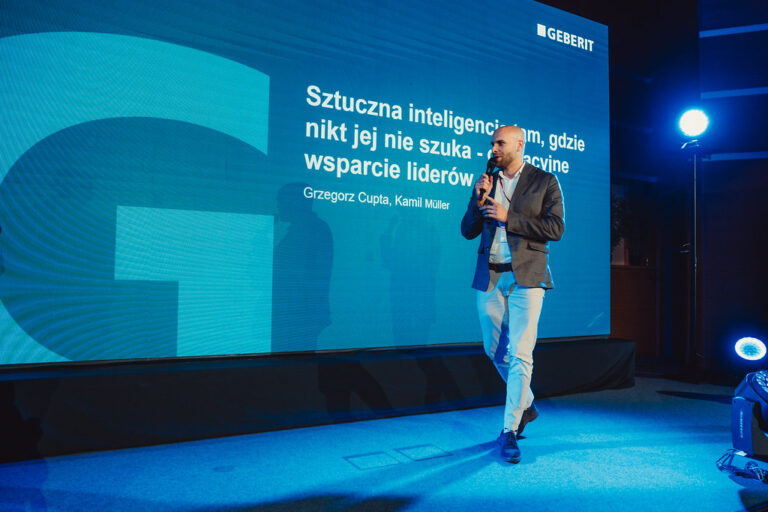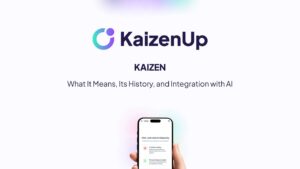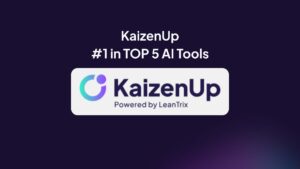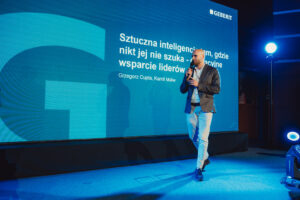What is Lean AI? It is an innovative approach that combines the philosophy of Lean Management with the power of artificial intelligence. Its goal is to use intelligent tools to better eliminate waste, improve processes, and deliver customer value. In other words, Lean AI applies AI technologies to execute Lean principles more effectively, enhancing continuous improvement and decision-making across organizations. In this article, we explore the evolution of artificial intelligence, the ideas behind Lean AI, and real-world industrial examples. At the end, we also present the keynote guests of Lean TWI Summit 2026 and their connection to Lean AI.
The Evolution of Artificial Intelligence
Artificial intelligence has come a long way—from academic research to a business-critical technology. Its journey began with simple rule-based systems in the mid-20th century, moved through machine learning in the 1980s, and advanced to today’s deep learning and neural networks. Milestones like IBM’s Deep Blue defeating a chess grandmaster (1997) and AlphaGo beating a Go champion (2016) demonstrated AI’s potential. Now, in the 2020s, AI can learn from vast datasets, recognize images and speech, translate languages, and generate coherent texts and images.
With more computing power and data access, AI has entered industries and become central to digital transformation. This mature stage of AI’s development sets the stage for its integration with Lean philosophy—two worlds ready for synergy.
Lean Management and AI: Two Worlds, One Goal
Lean Management originated in the automotive industry (Toyota) and emphasizes waste elimination, smooth workflow, and continuous improvement with employee involvement. AI provides tools for automatic data analysis and decision support. While from different eras, both aim to improve efficiency and deliver value. Merging Lean and AI means using smart algorithms to enhance traditional operational improvement methods.
In practice, Lean and artificial intelligence appear in several ways. AI can accelerate classical Lean initiatives: for example, IoT sensor data helps detect bottlenecks, and machine learning predicts equipment failures through predictive maintenance. AI also identifies hidden areas of waste invisible to the naked eye. Importantly, AI must be implemented with people in mind. Lean reminds us that people are central, so successful Lean AI implementations involve training teams and aligning expectations.
Some refer to this integration as Lean 4.0, Smart Lean, or Lean Automation. Regardless of the label, the core idea remains: blending Lean best practices with modern technologies to achieve exceptional results. Studies show that organizations combining Lean with AI deliver more value, significantly reduce waste, improve quality, and accelerate delivery.
Lean AI in Industrial Practice
Lean and artificial intelligence are not theoretical. Many companies are already using it. At the 2nd Lean TWI Summit 2025 in Wroclaw, examples from various industries demonstrated how AI powers continuous improvement. The conference included both Lean and AI tracks, highlighting practical applications of artificial intelligence in operations.
One example came from Geberit, a global sanitary product manufacturer. Geberit implemented generative AI to automate customer service email classification. The AI system automatically directed messages to the right department, reducing misrouted emails by over 70% and saving the equivalent of three months of work annually. Geberit also used ChatGPT to generate draft responses for consultants, improving service quality and speed.
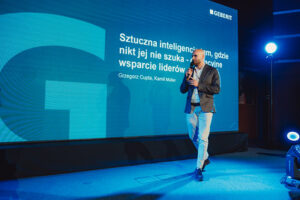
Another tool showcased was Kaizen AI—a platform for leaders using AI to support daily team management. Developed by LeanTrix, KaizenUp offers “AI for Supervisors,” helping managers monitor metrics, identify deviations, create instructions, and solve problems more efficiently. This is Lean AI in action: smarter, faster work while staying grounded in Kaizen philosophy.
Attendees at the summit could also join the AIDEAS workshops, hands-on sessions focused on business AI applications. Participants explored AI trends, use cases from global leaders, legal and ethical issues (like the EU AI Act), and mapped AI opportunities within their own companies. AIDEAS showed that Lean AI doesn’t require massive investments upfront—small, focused use cases can quickly bring value and pave the way for broader adoption.
Emerging Trends and Challenges in Lean AI
Lean and artificial intelligence continue to evolve, with emerging trends shaping its future. One trend is using AI to develop employee and leadership skills. At Lean TWI Summit 2025, experts highlighted how AI supports training (e.g., simulations, virtual coaches) and leadership development. Lean has always emphasized people; now AI becomes a partner in knowledge transfer and habit building.
Process optimization is another growth area. MES/ERP systems increasingly feature AI modules that analyze value streams in real-time, suggesting inventory reductions or flow improvements. Predictive maintenance is becoming standard, and autonomous systems are starting to optimize production parameters on their own. In the near future, AI might propose improvements traditionally initiated by engineers.
Of course, it brings challenges. Integrating AI requires change management so teams see it as support, not threat. Lean teaches us to value people in the process; top companies now train both people in AI and AI systems using employee knowledge. Ethical compliance, such as adhering to the AI Act, is crucial. But the direction is clear: the future of manufacturing lies in Lean 4.0—continuous improvement powered by smart technologies.
We had the opportunity to test KaizenUp during many “szkoleń lean” (eng. lean workshops) in Poland in 2025.
Lean TWI Summit 2026
Lean TWI Summit 2026 will further emphasize the Lean-AI connection, as shown by its featured guests.
One keynote speaker is Prof. Aleksandra Przegalinska, one of Poland’s top AI experts. A philosopher and futurist, she specializes in human-machine interaction and digital society. She is Vice-Rector for Innovation and AI at Kozminski University and a Senior Research Associate at Harvard University’s Center for Labor and a Just Economy. Her work explores ethical frameworks for AI and collaboration between humans and machines. At the summit, she will reflect on how intelligent systems can align with Lean culture, combining technology with humanistic values.
Another guest is Andrzej Danielewicz, Global Head of Data & AI Product Management at PepsiCo. He leads global AI initiatives in one of the world’s largest food companies. With a team of 300+ data and AI specialists, he scales AI across over 200 markets. Danielewicz has also worked at Apple and Mars and specializes in aligning data strategies with business impact. His talk will showcase how PepsiCo integrates AI into operations and continuous improvement, offering valuable insights for any Lean organization.
Beyond the keynotes, the summit agenda will include leadership and strategy sessions (Day 1), followed by case study presentations (Day 2) focused on Lean 4.0 implementations. Lean TWI Summit 2026 will present the full spectrum of Lean AI: from cultural and ethical insights to hands-on industrial applications.
Lean and artificial intelligence – Conclusion
It is no longer a buzzword—it’s a reality. As AI matures and becomes more accessible, even smaller organizations can use it to boost operational excellence. The combination of Lean philosophy and AI enables faster processes, fewer errors, and smarter use of human talent. But Lean AI must be approached wisely, with respect for people and ethics.
Events like Lean TWI Summit help the community learn, share, and evolve. The presence of global AI leaders, professors, and industry experts confirms that the future belongs to those who can merge Lean principles with artificial intelligence. Lean and artificial intelligence are not just a trend—it’s the next chapter of continuous improvement.
Important links:
Certified TWI Job Instruction Training
Co to jest TWI Training Within Industry?
